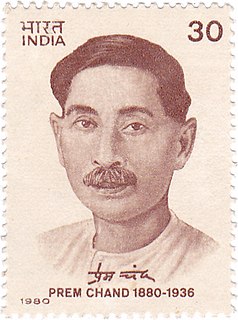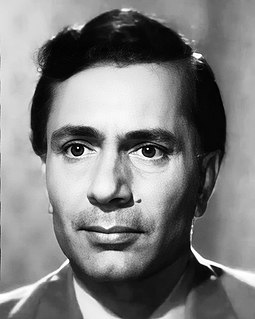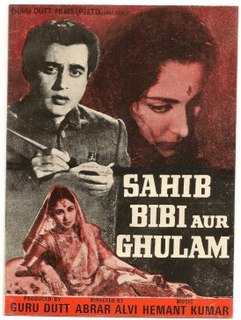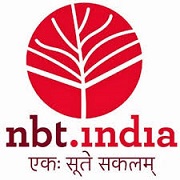
Urdu is an Indo-Aryan language spoken chiefly in South Asia. It is the official national language and lingua franca of Pakistan. In India, Urdu is an Eighth Schedule language whose status, function, and cultural heritage is recognized by the Constitution of India; it has some form of official status in several Indian states. In Nepal, Urdu is registered as a regional dialect.
Hindi literature includes literature in the various Central Zone Indo-Aryan languages which have writing systems. It is broadly classified into four prominent forms (styles) based on the date of production. They are:

Doordarshan is an Indian public service broadcaster founded by the Government of India, owned by the Ministry of Information and Broadcasting and one of Prasar Bharati's two divisions. One of India's largest broadcasting organisations in studio and transmitter infrastructure, it was established on 15 September 1959. Doordarshan, which also broadcasts on digital terrestrial transmitters, provides television, radio, online and mobile service throughout metropolitan and regional India and overseas.

All India Radio (AIR), officially known since 1957 as Akashvani, is the national public radio broadcaster of India and is a division of Prasar Bharati. It was established in 1936.

Dhanpat Rai Srivastava, better known by his pen name Premchand (pronounced [mʊnʃiː preːm t͡ʃənd̪], was an Indian writer famous for his modern Hindustani literature. Munshi Premchand was a pioneer of Hindi and Urdu social fiction. He was one of the first authors to write about caste hierarchies and the plights of women and labourers prevalent in the society of late 1880s.He is one of the most celebrated writers of the Indian subcontinent, and is regarded as one of the foremost Hindi writers of the early twentieth century. His works include Godaan, Karmabhoomi, Gaban, Mansarovar, "Idgah". He published his first collection of five short stories in 1907 in a book called Soz-e-Watan.

Awadhi, also known as Oudhi is an Eastern Hindi language of the Indo-Aryan branch spoken in northern India. It is primarily spoken in the Awadh region of present-day Uttar Pradesh, India. The name Awadh is connected to Ayodhya, the ancient city, which is regarded as the homeland of the Hindu god Rama. It was, along with Braj Bhasha, used widely as a literary vehicle before being displaced by Hindustani in the 19th century.

Balraj Sahni was an Indian film and stage actor, who is best known for Dharti Ke Lal (1946), Do Bigha Zameen (1953), Chhoti Bahen (1959), Kabuliwala (1961) and Garam Hawa (1973). He was the brother of Bhisham Sahni, noted Hindi writer, playwright, and actor.

Nanak Singh,, was an Indian poet, songwriter, and novelist of the Punjabi language. His literary works in support of India's independence movement led the British to arrest him. He published novels that won him literary acclaim.

Guru is a 2007 Indian Hindi-language drama film directed and co-written by Mani Ratnam. It stars Mithun Chakraborty, Abhishek Bachchan, Aishwarya Rai, R. Madhavan, Vidya Balan, and Roshan Seth, with Mallika Sherawat in a guest appearance. The score and soundtrack for the film was composed by A. R. Rahman.

Sahib Bibi Aur Ghulam is a 1962 Indian Hindi-language drama film that was directed by Abrar Alvi and produced by Guru Dutt, who also co-stars in it alongside Meena Kumari, Rehman, and Waheeda Rehman. The film, which is based on Bimal Mitra's Bengali-language novel Saheb Bibi Golam (1953), is set in the 19th century during the British Raj and focuses on Bhoothnath (Dutt), who meets Chhoti (Kumari), the lonely wife of a zamindar (Rehman). The film follows Chhoti's effort to keep her husband—who likes drinking and watching prostitutes perform—at their home by drinking with him. She becomes addicted to alcohol, leading both of them into bankruptcy.
Indian English has developed a number of dialects, distinct from the General/Standard Indian English that educators have attempted to establish and institutionalise, and it is possible to distinguish a person's sociolinguistic background from the dialect that they employ. These dialects are influenced by the different languages that different sections of the country also speak, side by side with English. The dialects can differ markedly in their phonology, to the point that two speakers using two different dialects can find each other's accents mutually unintelligible.
Maila Aanchal is a 1954 Hindi novel written by Phanishwar Nath Renu. After Premchand's Godan, 'Maila Anchal' is regarded as the most significant Hindi novel in the Hindi literature tradition. It is one of the greatest examples of "Anchalik Upanyas" in Hindi.
Nukkad is an Indian Hindi-language television series that aired on DD National in 1986–87. It was directed by Kundan Shah and Saeed Akhtar Mirza; it was written by Prabodh Joshi and Anil Chaudhary.
Bhagyawati is an 1877 novel by Shardha Ram Phillauri. The book is now acknowledged as the one of the first novels in Hindi. Previously, Lala Sri Niwas had written his Hindi novel Pariksha guru, which was published in 1882. Bhagyawati is believed to have been written mainly in Amritsar and was first published in 1877.

DD National is a state-owned public entertainment television channel in India. It is the flagship channel of Doordarshan, India's public service broadcaster, and the most widely available terrestrial television channel in India.

National Book Trust (NBT) is an Indian publishing house, which was founded in 1957 as an autonomous body under the Ministry of Education of the Government of India. The activities of the Trust include publishing, promotion of books and reading, promotion of Indian books abroad, assistance to authors and publishers, and promotion of children's literature. NBT publishes reading material in several Indian languages for all age-groups, including books for children and Neo-literates. They publish a monthly Newsletter about recent publications.
Bazaar-e-Husn or Seva Sadan is a Hindustani novel by Munshi Premchand.
ISO 8601 has been adopted as BIS IS 7900:2001.

Bible Ki Kahaniyan is an Indian Hindi-language television program based upon scriptures from the Bible. The production aspired to complete both Old Testament and New Testament narratives of the Bible but was later discontinued after covering the Patriarch narrative in the Book of Genesis. It was produced by Appachan through his Navodaya Studio and was broadcast on DD National from 1992 to mid 1993 and again, concluding with the remaining episodes, in 1996.

Andha Yug is a 1953 verse play written in Hindi, by renowned novelist, poet, and playwright Dharamvir Bharati (1926-1997). Set in the last day of the Great Mahabharat war, the five-act tragedy was written in the years following the 1947 partition of India atrocities, as allegory to its destruction of human lives and ethical values. It is a metaphoric meditation on the politics of violence and aggressive selfhood and that war dehumanized individuals and society. Thus both the victor and the vanquished lose eventually.













